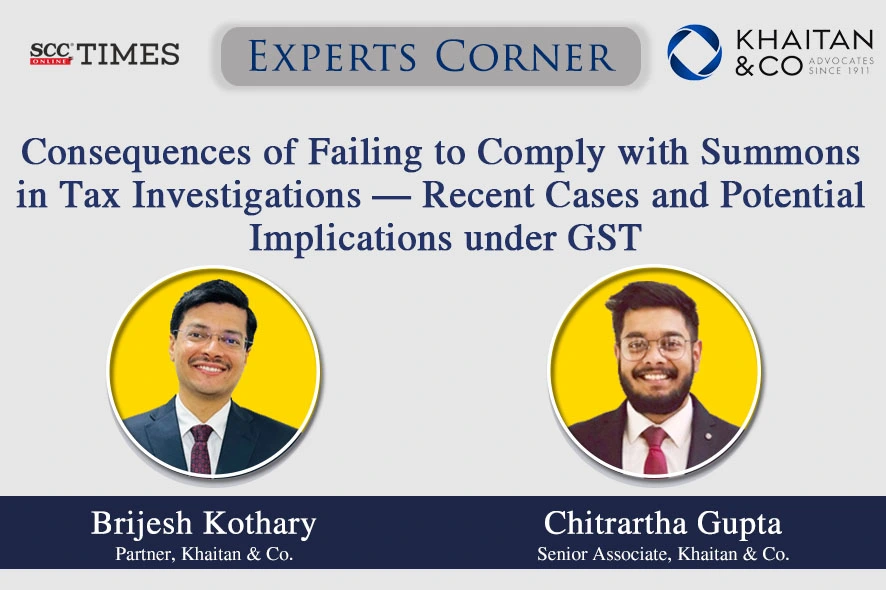Summons are often used as a tool by the Department to gather information related to a particular inquiry/investigation. From the erstwhile indirect tax regime to the present Goods and Services Tax (GST) and customs law, the provisions empowering officers to issue summons are usually uniform. The nature of the said inquiry is also invariably termed to be a “judicial proceeding” within the meaning of Sections 193 and 228 of the Penal Code, 1860 (IPC).
The persons summoned is required to attend either in person or usually through an authorised agent, failing which proceedings under Sections 174/175 IPC may be initiated.
It is interesting to note that Section 77(1)(c) of the Finance Act, 1994 (pertaining to levy of service tax), specifically provided for a monetary penalty, in case a person summoned fails to appear before the Central Excise Officer. Similar to erstwhile provision, Section 122 of the Central Goods and Services Tax Act, 2017 (CGST Act), enables imposition of fiscal penalty on the absentee. However, the Customs Act, 1962 (Customs Act), appears to be silent on this aspect.
In the above context, a question may arise as to whether non-appearance before the summoning authority even on account of bona fide reasons should necessarily entail prosecution under Section 174 IPC or whether the same shall be dealt in accordance with penal provisions existing in the respective statutes?
The Punjab and Haryana High Court in Rakesh Kumar Goyal v. Revenue Intelligence Directorate1, dealt with a similar situation wherein the respondent complainant alleged that even after issuing multiple summons under Section 108 of the Customs Act, the petitioner taxpayer intentionally remained absent from investigation, which led to filing of complaint for prosecution of the accused-petitioner under Sections 174 and 175 IPC.
While quashing the complaint as well as order passed by the Additional Sessions Judge, the High Court had following key observations:
(i) That the Customs Act is a Code in itself, providing for the procedure, penalties and jurisdiction.
(ii) In terms of Section 4 read with Section 5 of the Code of Criminal Procedure, 1973 (CrPC), the procedure prescribed in any special or local law for the time being in force shall remain unaffected from the procedure provided in CrPC.
(iii) In absence of a specific penalty provision in the Customs Act, a person failing to comply with summons issued under Section 108 shall be liable to penalty laid down under Section 117 of the Customs Act, which, while being a residuary provision, covers contraventions for which no express penalty is provided in the Customs Act. Had there been no provision like Section 117 in the Customs Act, obviously the person not complying with summons, would have been guilty of committing an offence under Sections 174/175 IPC, as the case may be.
In Satyendra Singh Kushwah v. State of Jharkhand2, the Jharkhand High Court held that when reply to summons were acknowledged by authority concerned then it cannot be said that the petitioners have not complied with the summons. In such circumstances, continuation of the proceeding under Section 174 IPC will amount to abuse of process of law issued by the authority especially when there are penalty provisions under the CGST Act.
From the above cases, courts appear to lay emphasis on imposing monetary penalty under respective statutes and have quashed criminal proceedings initiated by the Department. This observation appears to incline towards application of the doctrine lex specialis derogat legi generali which essentially means that if there are two laws, one governing a specific subject-matter (lex specialis) and another governing only general matters (lex generalis), the law specific to the situation prevails over the general law. In other words, the specific law takes precedence over the general law.
However, as per the frequently asked questions (FAQs) released by the Central Board of Indirect Taxes and Customs (CBIC) (3rd Edn. dated 15-12-2018), these penalty provisions are in addition to prosecution initiated under Section 174 IPC.
Clearly, in light of the foregoing analysis, whether specific/residual penalty provisions under GST statutes should prevail or whether such measures in tax statutes are in addition to criminal proceedings under IPC, is yet to be conclusively determined before the courts.
Various instructions by CBIC and judgments by High Court are in place to ensure that the Department during investigation should not call upon/summon key management personnel (KMPs), unless there are compelling reasons. Nevertheless, often the management of the business entity concerned are frequently summoned at short notice from different parts of the country. In such a scenario, where in-person appearance is difficult on account of bona fide business/personal reasons, the option of participation through authorised representatives should be explored.
However, “pressure tactic prosecutions” under IPC continue to be threatened against such KMPs.
In such cases, to mitigate and limit any further exposure it is vital to maintain a record of all official communications with the Department and evaluate options for seeking judicial remedy. Additionally, industry should proactively approach the Board and seek issuance of directions to the Department listing circumstances under which such prosecution may be launched.
*Partner, Khaitan & Co.
**Senior Associate, Khaitan & Co.
1. 2024 SCC OnLine P&H 4291.







